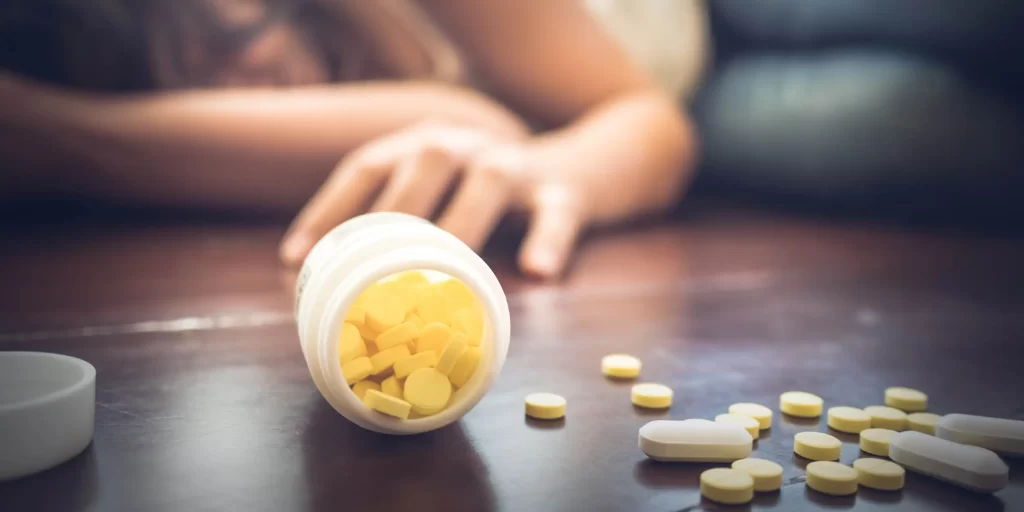
The misuse of benzodiazepines, also known as “benzos,” is becoming increasingly common in the United States. In fact, up to 18% of Americans have misused sedatives like benzos. One of the risks linked to drug misuse is overdose. In the case of benzos, overdose can be deadly. The risk is even higher if other drugs are used alongside the benzodiazepine. To safely use benzos, it is important to understand the risks of overdose and how to avoid them.
Benzodiazepine Overdose Symptoms
If someone has overdosed on benzos, they need to get to the hospital quickly. Without treatment, dangerous symptoms such as slowed breathing can occur. The overdose risk is even higher if the drug has been mixed with alcohol or a central nervous system depressant, such as an opioid. Benzodiazepine overdose signs include:
- Problems moving
- Slurred speech
- Drowsiness
- Passing out
- Slow breathing
In addition, benzo overdose may cause pupil and eye movement changes. These include:
- Small pupils
- Slow or no pupil changes in response to changes in light
- Eye movements the person can’t control
Risk Factors for Benzodiazepine Overdose
Certain risk factors are common in overdoses, regardless of the drug. More than 90% of accidental drug overdose deaths have at least one of the following risk factors:

It's time to get your life back.
If you are struggling with addiction and co-occurring mental health, our expert team is here to guide you every step of the way. Don’t wait— reach out today to take the first step toward taking control of your life.
- History of substance misuse
- Drug diversion
- Taking a drug through an unapproved route (ex. crushing and snorting pills that are meant to be swallowed)
- Having more than five doctors prescribing a controlled substance
- Drinking while using drugs
- Illicit drug use
- History of overdose
- Taking an opioid
Taking benzos and alcohol can cause overdose risks to increase. There are also increased risks related to benzo use in elderly people. Other risk factors specific to benzodiazepine overdose include:
- Lung problems
- Sleep apnea
- Liver problems
- Use with other sedating drugs, such as opioids. Because of the risk of overdose, the CDC recommends against mixing benzos and opioids
Old age and the use of other drugs are the major risk factors for complications from benzo overdose, which include death.
Benzodiazepine Overdose Treatment
Because benzodiazepine overdose is common in when used with other substances, the doctor will likely run a few tests to make a full assessment. In addition, certain medical conditions like having low blood sugar can cause similar symptoms to overdose. Common tests include:
- Blood tests
- Urine drug test
- Heart rhythm tests
- Pregnancy test
- Brain scan
The main therapy for benzo overdose is symptomatic treatment. Some patients with slow breathing may need to be intubated to ensure they get enough oxygen. Rarely, a drug called flumazenil can be used to treat an overdose.
Flumazenil
Flumazenil is an FDA-approved medication to reverse benzodiazepine overdose. The medication is given intravenously and acts as an antidote for benzo overdose. It is only used in medical settings.
Because its structure is similar to benzodiazepines, it fits into the same receptor in the brain. This is called the gamma-aminobutyric acid-a, or GABA, receptor. Unlike benzos, flumazenil does not have any sedating effect. Flumazenil works by competing with benzos in the brain for GABA receptors. When the benzodiazepine is unable to bind to the receptor in the brain, it can no longer be active. Therefore, this treatment can cause reversal for a benzo overdose.
However, flumazenil has limited use. It is often reserved for patients who have taken no drugs other than a benzodiazepine or a sedative-hypnotic. Further, doctors have found that it sometimes causes more harm than good. After all, flumazenil causes benzo withdrawal and can lead to seizures and abnormal heart rhythm. Because of the risks, flumazenil is often avoided in patients with:
- An overdose from an unknown substance
- An overdose on multiple drugs
- Tolerance to benzodiazepines
- History of seizures
- A heart problem called a prolonged QRS interval
Benzodiazepine Overdose Statistics
From 1999 to 2016, benzodiazepine overdose deaths rose more than seven-fold. As of 2016, 4.4 out of every 100,000 adults died of a benzo-related overdose. Roughly one-third of emergency room visits for drug misuse in 2010 involved benzos.
Some groups are hit harder than others. For example, from 1999 to 2017, the benzodiazepine overdose death rate among women aged 30 to 64 rose by an enormous 830%. Many overdose deaths linked to benzos also involve other drugs. In 2015, more than 20% of those who died from an opioid overdose also tested positive for benzos.
Preventing a Benzodiazepine Overdose
If you or a loved one is taking benzos, there are steps you can take to avoid overdose. You should:
- Take your medicine as your doctor prescribed it. Do not take it more often than prescribed or take it by a different route.
- Only take drugs that are prescribed to you. Do not share your medication with others. It is against federal law to share them.
- Dispose of old prescriptions.
- Make sure your doctor and pharmacist know all the medications you are taking so they can check for interactions. This is more easily done if you get all your prescriptions from a single doctor and a single pharmacy.
- Avoid drinking alcohol.
- Avoid mixing your medicine with other drugs unless directed by your doctor
- Keep all drugs out of reach of children and pets
If you or a loved one struggles with benzo misuse or addiction, The Recovery Village Ridgefield is here to help. Our addiction experts can help guide you to a better, safer life that is free from benzodiazepine misuse. Contact us today to learn more about treatment options that can work well for you.



